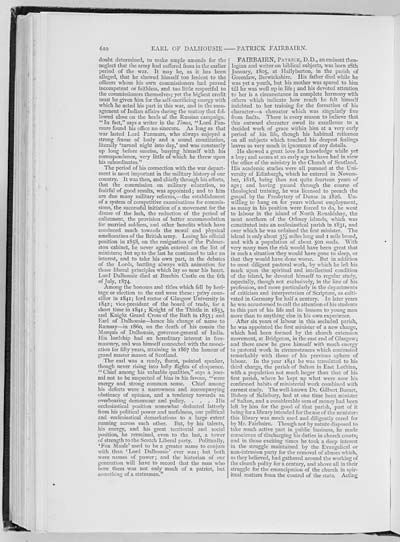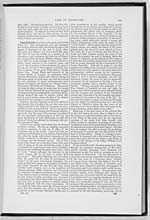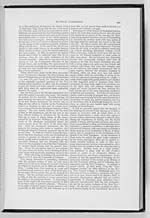Volume 3 > Half-Volume 6
(256) Page 610 - Fairbairn, Patrick
Download files
Individual page:
Thumbnail gallery: Grid view | List view

6io doubt determined, to make ample amends for the neglect that the army had suffered from in the earlier period of the war. It may be, as it has been alleged, that he showed himself too lenient to the officers whom his own commissioners had proved incompetent or faithless, and too little respectful to the commissioners themselves; yet the highest credit must be given him for the self-sacrificing energy with which he acted his part in this war, and in the man- agement of Indian affairs during the mutiny that fol- lowed close on the heels of the Russian campaign. "In fact," says a writer in the Times, "Lord Pan- mure found his office no sinecure. As long as that war lasted Lord Panmure, who always enjoyed a strong frame of body and a sound constitution, literally 'turned night into day,' and was constantly up long before sunrise, busying himself with his correspondence, very little of which he threw upon his subordinates." The period of his connection with the war depart- ment is most important in the military history of our country. It was then, and chiefly through his efforts, that the commission on military education, so fruitful of good results, was appointed; and to him are due many military reforms,�the establishment of a system of competitive examinations for commis- sions, the successful initiation of a movement for the disuse of the lash, the reduction of the period of enlistment, the provision of better accommodation for married soldiers, and other benefits which have conduced much towards the moral and physical amelioration of the British army. Losing his official position in 1858, on the resignation of the Palmer- ston cabinet, he never again entered on the list of ministers; but up to the last he continued to take an interest, and to take his own part, in the debates of the Lords, battling always with animation for those liberal principles which lay so near his heart. Lord Dalhousie died at Brechin Castle on the 6th of July, 1874. Among the honours and titles which fell by heri- tage or election to the earl were these: privy coun- cillor in 1841; lord rector of Glasgow University in 1842; vice-president of the board of trade, for a short time in 1841; Knight of the Thistle in 1853, and Knight Grand Cross of the Bath in 1855 ; and Earl of Dalhousie�hence his change of name to Ramsay�in 1860, on the death of his cousin the Marquis of Dalhousie, governor-general of India. His lordship had an hereditary interest in free- masonry, and was himself connected with the associ- ation for fifty years, attaining in 1867 the honour of grand master mason of Scotland. The earl was a ready, fluent, pointed speaker, though never rising into lofty flights of eloquence. "Chief among his valuable qualities," says a jour- nal not to be suspected of bias in his favour, "were energy and strong common sense. Chief among his defects were a narrowness and accompanying obstinacy of opinion, and a tendency towards an overbearing demeanour and policy. . . . His ecclesiastical position somewhat deducted latterly from his political power and usefulness, our political and ecclesiastical demarkations to a large extent running across each other. But, by his talents, his energy, and his great territorial and social position, he remained, even to the last, a tower of strength to the Scotch Liberal party. Politically, 'Fox Maule' used to be a greater name to conjure with than 'Lord Dalhousie' ever was; but both were names of power; and the historian of our generation will have to record that the man who bore them was not only much of a patriot, but something of a statesman." FAIRBAIRN, PATRICK, D.D., an eminent theo- logian and writer on biblical subjects, was born 28th January, 1805, at Hallyburton, in the parish of Greenlaw, Berwickshire. His father died while he was yet a youth, but his mother was spared to him till he was well up in life; and his devoted attention to her is a circumstance in complete harmony with others which indicate how much he felt himself indebted to her training for the formation of his character�a character which was singularly free from faults. There is every reason to believe that this outward character owed its excellence to a decided work of grace within him at a very early period of his life, though his habitual reticence on all subjects which touched his deepest feelings leaves us very much in ignorance of any details. He showed a great love for knowledge while yet a boy; and seems at an early age to have had in view the office of the ministry in the Church of Scotland. His academic studies were all pursued at the Uni- versity of Edinburgh, which he entered in Novem- ber, 1818, being then not quite fourteen years of age; and having passed through the course of theological training, he was licensed to preach the gospel by the Presbytery of Dunse in 1826. Un- willing to hang on for years without employment, as many in his position were forced to do, he went to labour in the island of North Ronaldshay, the most northern of the Orkney islands, which was constituted into an ecclesiastical parish in 1831, and over which he was ordained the first minister. The island is only about 3� miles long and I mile broad, and with a population of about 500 souls. With very many men the risk would have been great that in such a situation they would have gone to sleep, or that they would have done worse. But in addition to most diligent pastoral work, by which he left his mark upon the spiritual and intellectual condition of the island, he devoted himself to regular study, especially, though not exclusively, in the line of his profession, and more particularly in the departments of criticism and interpretation of Scripture, as culti- vated in Germany for half a century. In later years he was accustomed to call the attention of his students to this part of his life and its lessons to young men more than to anything else in his own experience. After six years of labour in this secluded parish, he was appointed the first minister of a new charge, which had been formed by the church extension movement, at Bridget on, in the east end of Glasgow; and there anew he gave himself with much energy to pastoral work in circumstances which contrasted remarkably with those of his previous sphere of labour. In the year 1841 he was translated to his third charge, the parish of Salton in East Lothian, with a population not much larger than that of his first parish, where he kept up what were now his confirmed habits of ministerial work combined with earnest study. The well-known Dr. Gilbert Burnet, Bishop of Salisbury, had at one time been minister of Salton, and a considerable sum of money had been left by him for the good of that parish, part of it being for a library intended for the use of the minister: this library was much used and diligently cared for by Mr. Fairbairn. Though not by nature disposed to take much active part in public business, he made conscience of discharging his duties in church courts; and in those exciting times he took a deep interest in the struggle maintained by the Evangelical or non-intrusion party for the removal of abuses which, as they believed, had gathered around the working of the church polity for a century, and above all in their struggle for the emancipation of the church in spir- itual matters from the control of the state. Acting
Set display mode to:
![]() Universal Viewer |
Universal Viewer | ![]() Mirador |
Large image | Transcription
Mirador |
Large image | Transcription
Images and transcriptions on this page, including medium image downloads, may be used under the Creative Commons Attribution 4.0 International Licence unless otherwise stated. ![]()
| Biographical dictionary of eminent Scotsmen > Volume 3 > Half-Volume 6 > (256) Page 610 - Fairbairn, Patrick |
|---|
| Permanent URL | https://digital.nls.uk/74514786 |
|---|---|
| Attribution and copyright: |
|
| Description | Volume III. Contains names alphabetically from Macadam to Young. |
|---|

